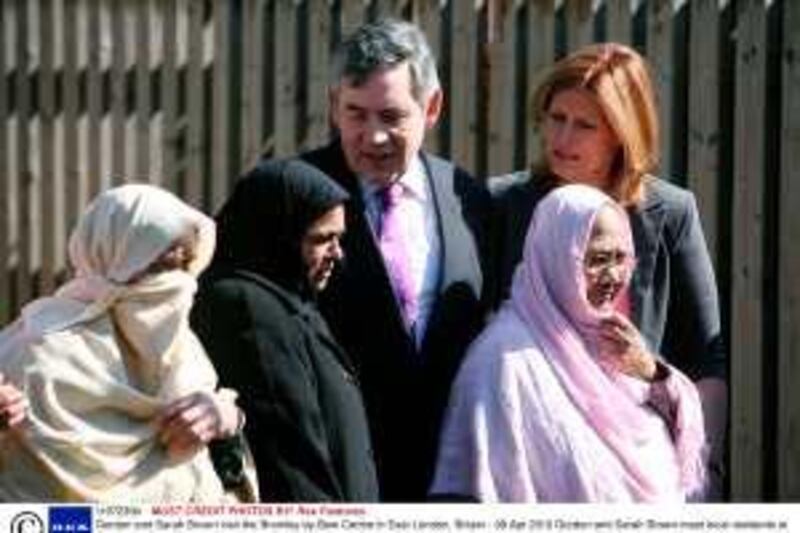LONDON // They form only a small percentage of the electorate yet, paradoxically, it could be Britain's Muslims who determine the outcome of next month's general election. The reason is simple: although there are only about two million Muslims in a nation of 61 million, their numbers are concentrated in a relatively small number of towns and cities throughout the country.
The Muslim Public Affairs Committee UK (MPacUK), a London-based civil liberties group, estimates that the Muslim vote could prove to be the deciding factor in 82 marginal constituencies - a crucial element when both the Labour and Conservative parties are fighting a close battle to get an overall majority in the 646-seat parliament. Traditionally, the bulk of the Muslim vote has gone to the ruling Labour Party, which has been regarded as more sympathetic towards Muslim immigrants.
Despite the British military excursions in Iraq and Afghanistan and the introduction of antiterrorism laws, 57 per cent of the country's Muslims said they intended to vote Labour in a poll earlier this year. The same poll, however, found that only 32 per cent of Muslims were "absolutely certain" to vote, compared to 47 per cent across the nation. Such a lack of interest, plus the fact that a high proportion of Muslims does not even register to vote, has prompted a variety of campaigns this year to get people to the polls.
The Muslim Council of Britain (MCB), an umbrella organisation for almost 500 groups nationwide, has launched a Muslim Vote 2010 campaign, complete with a website, spelling out why it is vital for Muslims to exercise their democratic rights. "Voting is not only a civic imperative - it's a religious obligation," said Muhammad Abdul Bari, the MCB secretary general. "We have a religious obligation to join others to seek the common good."
Leading Muslim scholars have given their backing to the Get Out and Vote website. The imam Abu Eesa Niamatullah, from the Prophetic Guidance Project, told the BBC Asian Network: "Despite the fact we have large numbers, we are not making our presence felt." The clerics and scholars are attempting to counter concerns among some sections of the Muslim community about voting for a government that does not comply with Sharia, or for a party that supports abortion and the consumption of alcohol.
Activists from the hardline Hizb ut-Tahrir have been attempting to capitalise on these fears, distributing leaflets outside mosques and community centres in London, Manchester, Birmingham and Bradford, laying out their arguments on why it is forbidden for a Muslim to vote. But the imam, Abu Eesa, said voting was "an affirmation that, while living under the rule of man, we will try our best to create a scenario that will benefit our community".
MPacUK, meanwhile, has launched Operation Muslim Vote, distributing tens of thousands of leaflets after Friday prayers and mounting campaigns against MPs deemed to be ignoring Muslim concerns, including the immigration minister Phil Woolas, who is seeking re-election in the marginal seat of Oldham. "MPacUK is now harnessing the power of Facebook and YouTube to spread the message that anger over foreign policy, Islamophobia and civil liberties can be translated into change through the ballot box," said a spokesman.
The organisation is running commercials throughout the day on the Islam Channel TV station and teams of volunteers are working with mosques on voter registration through Friday sermons, events at community centres and with women's groups. Issues close to many Muslims' hearts are, inevitably, foreign affairs and growing Islamophobia throughout Europe. State-funded faith schools, support for religious dress and the availability of halal meat are among other subjects exercising British Muslims' minds.
"But we cannot be some parochial self-serving lobby group that can be fobbed off with a school, a scarf and a few lamb chops," argues the Muslim lifestyle magazine Emel. "Islam is about bringing benefit to all people: 'You are a community beneficial to all mankind,' the Quran demands. We should be calling for change that supports the common good of all." The magazine points out, though, that British Muslims are three times more likely to be unemployed than the general populace and far less likely to hold a university degree.
Additionally, they have a high incidence of health-related issues and are far more likely to hold unskilled or low paid jobs. Despite the potential significance of Muslim voters, the are few signs yet of the three mainstream parties going out of their way to specifically woo them, despite - or, perhaps, because of - the anti-Islamic rhetoric of two right-wing parties, the UK Independence Party and the British National Party.
Rukiya Dadhiwala, the MPacUK campaign co-ordinator, however, does not believe that the bulk of Muslim voters will revert to their old habits and vote in the main for Labour candidates. "Muslim voters can no longer be taken for granted by Labour as a new politicised generation are becoming swing voters who demand action on issues from Palestine to antiterror laws," he says. dsapsted@thenational.ae






